Russia, Denmark And The Esports Political Football
The PGL Copenhagen Major was put under pressure to exclude Russians from the tournament by members of the Danish government. Let's take a look at why that might be.
In March of this year Romanian esports tournament organiser PGL ran the latest instalment in the Counter-Strike Majors in Copenhagen. It was Denmark’s first event of its kind and surprisingly was not run by the Danish company BLAST. Still, it represented a continuance of Denmark’s long history as a hub for esports having historically fostered a positive and accepting culture around what is still seen in many other countries as niche. As is to be expected then the Danish government had taken a great interest in the event but not the kind you might expect. Rather than focusing on the prestige and pomp of the tournament itself, what it meant for the development of Danish esports and the ever-growing fanbase in the country, it seemed they were more interested in creating a very public stink about the attendance of Russian participants.
"As long as Russia continues its illegal war on Ukraine, I don't think Russian athletes should be allowed to compete in international sports," Jakob Engel-Schmidt , the Danish Minister for Culture said in an interview with Danish outlet Berlingske "That of course includes E-sports.”
"Even though it is a Romanian tournament organizer, I want to encourage them to ban Russian participation," Engel-Schmidt continued. "I also want to heavily encourage Royal Arena to be more critical when deciding what they want to host.”
While this was the public statement on the matter behind the scenes things were a lot more severe. The Danish government had contacted PGL and made several “requests” of the Major broadcast which all amounted to nothing that could be construed as political messaging about Russia being used on the broadcast. This translated to decisions not to use international flags for the competing teams and on-air talent not using the word “Russia” on broadcast… No, it was safer to avoid the whole mess since, as we’ll get to, the Danish government were potentially incentivised to shut the event down under even the flimsiest pretext.
Suddenly small details you may have noticed should come into sharp focus. Think Cloud9 player Abay "HObbit" Khassenov doing the playoff stage interview usually reserved for captains in traditional Kazakhstani garb. Oh yes, the players were more than aware of the situation too and it’s hard to imagine the increased scrutiny wasn’t very much on their minds. It wasn’t just weird moments like this either… I know of at least two organisations who advised players not to say anything about the ISIS massacre that occurred in Moscow during the tournament lest it be construed as a “pro-Russian message.”
How strongly did Engel-Schmidt really feel about all this? Before you answer that question consider the following. At the BLAST Premier Fall Finals in November of 2023 he stood on stage in the Royal Arena to introduce the semi-finals of the tournament. Playing that day was Cloud9 a team comprised of four Russian players. He had said nothing about their participation in the build up despite them being the first match of the day and was actively speaking about the positives the event had brought to Denmark. Also of note in January BLAST expanded their partner teams to include Team Spirit and Virtus Pro, both of whom include Russian players on their roster. Again, Engel-Schmidt didn’t express any public dismay about this development. When confronted about this by the website Dust2.dk he simply dismissed it and said “It is news to me that Russians were present at BLAST last year, but of course I am not part of the planning.” He added nothing further seemingly lacking an opinion on the matter as it pertains to the Danish company that, as we’ll get to, is partially owned by the government he represents.
It’s probably also worth noting that BLAST have themselves penned deals with multiple human rights violating governments. While they walked away from a deal with the Saudi Arabian Public Investment Fund’s mega-city project NEOM they have done deals with the governments of Bahrain and Abu Dhabi. These partnerships were rightly scrutinised in the Danish media although BLAST themselves have never commented on these relationships. Funnily enough neither has the paragon of virtue Engel-Schmidt.
What won’t come as a surprise to you will be the revelations about Engel-Schmidt’s own moral failings. For instance, perhaps it’s not great messaging that the Danish government sends a disgraced politician to be the one who attends esports events. Engel-Schmidt was convicted of driving under the influence of cocaine and had his license revoked for three years. During his interaction with police he refused to co-operate and tried to game the system, absurdly stating that he “genuinely” believed he had nothing in his system. How did that cocaine into his blood? Apparently that was also news to him. Maybe the families who have lost loved ones due to drivers getting behind the wheel of a vehicle while intoxicated can similarly implore that the Royal Arena be more critical when deciding who they want to host.
A Deeply Stupid Time In Esports
We’ll revisit the ridiculousness of Engel-Schmidt in a moment but first let’s take a trip down memory lane and recall a deeply stupid time in the industry. The invasion of Ukraine led to esports tying itself in knots as it tried to decide which way was going to generate the largest collective pat on the back possible. For the first month or so it was “esports is a space of togetherness and politics won’t tear us apart.” Then, invariably, politics tore us apart and suddenly we were dispensing inconsistent sanctions that to this day have not been explained. Gambit Esports were essentially forced out of business and had to sell their CS team to an American owned organisation using a Norwegian talent agency as a proxy at a time when giving money to Russians was “funding Putin’s war machine.” Virtus Pro had to pretend they were an organisation called “Outsiders” and wear plain white jerseys with no sponsors on them. Meanwhile ForZe, sponsored by Russia’s LUKOIL, turned up to events with their team, logo and sponsor intact, even as their executives kept dying in the type of mysterious circumstances that seem prevalent in Russia. Of course no-one decided to issue sanctions to anyone taking money from Saudi Arabia or the US military despite the bombs being dropped on Yemeni children because it’s just different when civilian casualties are brought to you by Raytheon.
BLAST had been a dissenting voice in the Counter-Strike community issuing an edict to ban “Russian based teams” from their competitions in March 2022. A typically inconsistent message, this didn’t apply to teams with a majority of Russian players nor did it theoretically apply to Russian operated teams that temporarily rehoused to Balkan nations. Even the accompanying statement was absurd saying that “gaming and esports unites people from all races, countries and beliefs” as they actively put rules in place to divide people.
In reality it was an easy decision for BLAST as none of the teams the sanctions would have applied to at the time – Gambit, Virtus Pro, ForZe, k23 and Team Spirit – were partners and therefore would have had to qualify to participate in any of their large events. When Virtus Pro won the CS:GO Major in Rio that November though they wasted no time in attempting to steal the thunder from their victory by posting about how they had qualified for their world finals event so long as they attended under their “neutral” name and identity. Once again you will note no strong feelings about Russians when it helps strengthen the credibility of their tournaments.
Of course no such stipulation should have been required. In September of 2022 it was already public knowledge that the Russian ownership had sold their stake to Armenian businessman Aram Karamanukyan who was also taking over as CEO. Their legal address is listed as being in Armenia. While many publicly were sceptical about the sale and threw around accusations of Karamanukyan being a puppet there was zero proof this was the case and the tournament operators that made the biggest song and dance about “Outsiders” were also the least equipped to be able to investigate any of the allegations they effectively intimated.
BLAST would not be alone in participating in this farcical public dance. In January 2023 the Armenian owned Virtus Pro would unveil the Rio Major trophy they won under the “Outsiders” name. Keep in mind the purpose of the “Outsiders” pretense was simply to avoid promoting brands that were believed to have ties to Russian oligarchs and as such there never was an Outsiders organisation. It was simply a temporary and ultimately needless rebranding of Virtus Pro, a brand name that has a prestigious heritage across all of esports, in a bid to avoid public controversy and placate Ukrainian stakeholders. Only the most ill informed esports fan could be under the delusion they were a new and separate organisation that just so happened to inherit the squads and staff from Virtus Pro. Incredibly the Vice President of Product Development at ESL Michal Blicharz publicly proclaimed the “reveal” of Virtus Pro as being the real Outsiders was an “unwelcome surprise” and that by celebrating their win they were “misrepresenting” reality. To underline how ludicrous this statement is I would ask if you agree with it do you also believe the fictitious Richard Bachman really wrote those books because Stephen King used a pen-name?
Blind To Exceptionalism
In the end all of the posturing slowly and quietly stopped and by the time the Copenhagen Major had arrived the scene seems to have mostly arrived at the correct decision to not sanction people based on nationality. To do so would only have invited more scrutiny regarding the layer cake of double standards on which esports is built. On that note let me editorialise for a moment on the matter of banning Russian citizens from competition. My personal views have been clear and unwavering since the invasion. I am of the belief that to hold individuals accountable for the actions of their government, ones they might not support nor even have voted for, is immoral in all but the most fringe cases. Governments very often act not only contrary to the wishes of their theoretical electorate but often against their interests too and so to further penalise these people seems equal parts ridiculous and pernicious. This becomes especially true when you consider the fact that the young and well-travelled demographic that makes up those who compete in esports are, for the most part, exactly the type of comparative cosmopolitan that do not support the activities of dictators.
“Oh, so why don’t they vocalise this” you gnash and wail, desperate for your own type of public validation for being on the right side of history… What an equally outrageous demand from people who risk nothing by speaking out. I have never seen this standard applied anywhere else, one where the majority demand that others must speak out against their government and risk prison time, persecution for themselves and their families or even worse to satisfy the sensibilities of people who would never take equivalent risks. Why do we not make similar demands for those toiling in the fields of North Korea, or paying taxes in Xinjiang, or doing business in Riyadh? Why is this the one and only despotic regime that you must let crush you to show fealty to the global in-group?
Still, if we must keep this energy then let us be thorough and consistent. It seems no great leap that if you believe Russian people must be banned for the crimes of their government then you would absolutely support a ban on US citizens suffering similar sanctions. After all, we know that they invaded the sovereign nation of Iraq against the explicit outlines of the UN charter and started a war deemed illegal according to the Secretary General Kofi Annan. This action led to the deaths of hundreds of thousands of civilians and the resulting occupation saw multiple incidents that meet the modern understanding of being a war crime. Yet not only do we shrug this off in our exceptionalism, we then don’t bat an eyelid when the same war criminals sponsor the very esports events people would seek to ban Russians from. Social media morality is the playground of the absurd.
For a final point on this, if any must be made, I’m a British citizen whose government was also complicit in the aforementioned invasion of Iraq. Tony Blair’s cabinet was so desperate to justify war they lied to the people through falsified intelligence, forced the journalist who exposed those lies to reveal his source and then that source died in a strange suicide which dozens of expert coroners rejected as being the cause of death. The public sentiment at the time was vehemently anti-war and I know because I was there and I, living in a country where peaceful protest was a right, marched against it with the rest of the motivated populace. Parliament voted to invade anyway. Have I then forfeited my own right to attend or work events? What more could I have done? What should the appropriate penalties be for me? Exactly how much Iraqi blood is on my hands?
It is my belief that these arguments are all much stronger than those that inform the position to ban everyday Russians from travel and competition. The arguments against my beliefs seem to comprise of assumptions such as “well, we know Russians secretly support Putin whatever they say publicly” or “all competition that glorifies Russia is used by the state to encourage war efforts.” These are hollow proclamations that again could be copy-pasted against any nation that engages in aggressive acts against others and they have no real connection to individuals. It’s just a form of “othering” that makes taking extreme stances such as these easier to commit to. There’s a simple question I would ask Engel-Schmidt that should underline the weak foundations of his own beliefs and that is “if you feel it is essential to ban Russians from competition why have you not petitioned your own government for a travel ban?” The option was most assuredly there and yet Denmark instead elected to reclassify Russians from Group 3 nationals to Group 5, meaning that while applications would receive greater scrutiny and they could only apply for single entry visas, they could still enter the country to participate in business and tourism just with difficulties that didn’t exist before the Ukrainian invasion.
I’m sure you will have noted that countries issuing blanket bans on Russian travel are thin on the ground and not without reason. Many European countries have spent decades building ties with Russian oligarchs and using their country’s looser attitude to financial regulation to make money. Only this year the UK’s home office was embroiled in a scandal over “golden visas” being dispensed to wealthy Russians even as the government seized Russian owned assets including Chelsea football club. It’s equally worth remembering it’s not exactly ancient history that Denmark’s largest bank was involved in a money laundering scandal that was going through – you guessed it – Russia. European politicians wouldn’t want to make shady backroom dealings needlessly difficult by actually enforcing the rules they would demand of private businesses so for now you can rest assured no such travel bans would manifest; it is fairness enacted for most likely the wrong reasons.
Who Owns BLAST?
Of course it’s not a shock when politicians traffick in hypocrisy. It’s not only the nature of their business but I’d argue the type of person that gravitates towards politics has it in their nature to begin with. Yet what if I told you that there wasn’t just double-standards at play here but rather something that appears to be more traditionally cutthroat in nature? You see what most people don’t understand is that the Danish government owns a significant portion of BLAST and would therefore have a vested interest in the continuing success of that tournament operator. This isn’t a whispered conspiracy theory or unprovable presupposition. Because it’s Denmark it’s a matter of a public record.
Anyone can access Denmark’s Central Business Register and peruse the details of companies that operate there. When you do you will find the following details about BLAST’s ownership that certainly hasn’t been talked about enough, especially in light of the antics during PGL’s Danish tournament. Their owners include Danmarks Eksport- og Investeringsfond (EIFO) a government startup fund whose goal is to help new companies establish a footing in Denmark. They provide capital in the form of loans that can be converted into equity, either through choice or in lieu of repayment and now own between 10% and 14.99% of BLAST. Vækstfonden Growth K/S is another investment fund which now falls under the umbrella of EIFO. They are focused on providing convertible loans for startups that have an “aggressive growth plan.” They own 10%-14.99% of BLAST. Heartcore Capital Fund III K/S is another investment fund with a technology focus owns between 10% and 14.99% as of 2021 filings. Not that you would know it from their website they are co-owned by EIFO and the European Investment Fund. Depending on how those percentages break that could effectively make the Danish government a majority shareholder in BLAST which should cast a new light on their attention to PGL’s event. After all, it is essentially a non-Danish company, one who is a direct rival to BLAST, coming into Copenhagen to run an event in a stadium synonymous with BLAST events that was inarguably bigger and better than the ones BLAST themselves have put on. Hard to imagine that would go over well with stakeholders and, in this instance, shareholders.
With all of this in mind it’s hard to really view the disparate amount of attention as anything other than business focused rather than an expression of any genuine sentiment. Speaking as someone who worked the event I saw firsthand how far that attention extended and it would be my opinion that there was certainly a hope that PGL would trip up and an incident would occur. Functionally instead all it ultimately translated to were Russian competitors being worried about expressing any grief for the victims of a terrorist attack on their home soil so job well done I guess.
Moving forward this is something to be mindful of. With an increasing number of global governments underwriting what esports has become their own geopolitical views will come baked in to the events you participate in. Whether it’s using the invasion of Ukraine to apply pressure to business competitors, having to show fealty to “One-China” policy or not being able to guarantee the safety of gay and trans competitors on foreign soil there’s not going to be anywhere to hide from the whims of politicians. It makes it clearer now than ever that no matter how much anyone says to the contrary esports is no longer for everybody and who is excluded isn’t being decided by the players or the sponsors. That is now being decided by the same people who decide everything else.
Disclosure: The author of this piece has worked freelance for PGL on several occasions and will be working future PGL events.


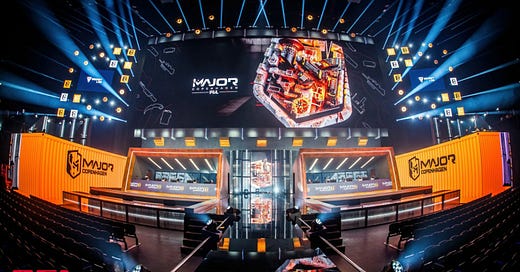



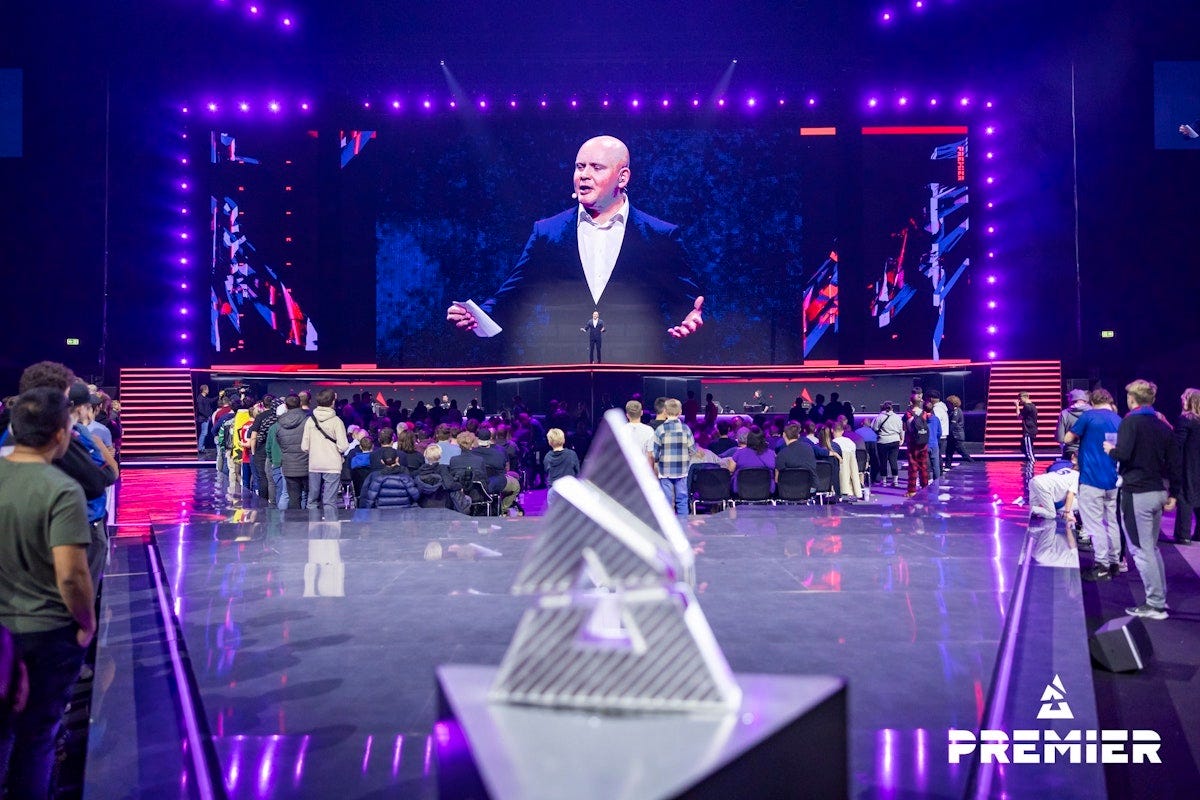
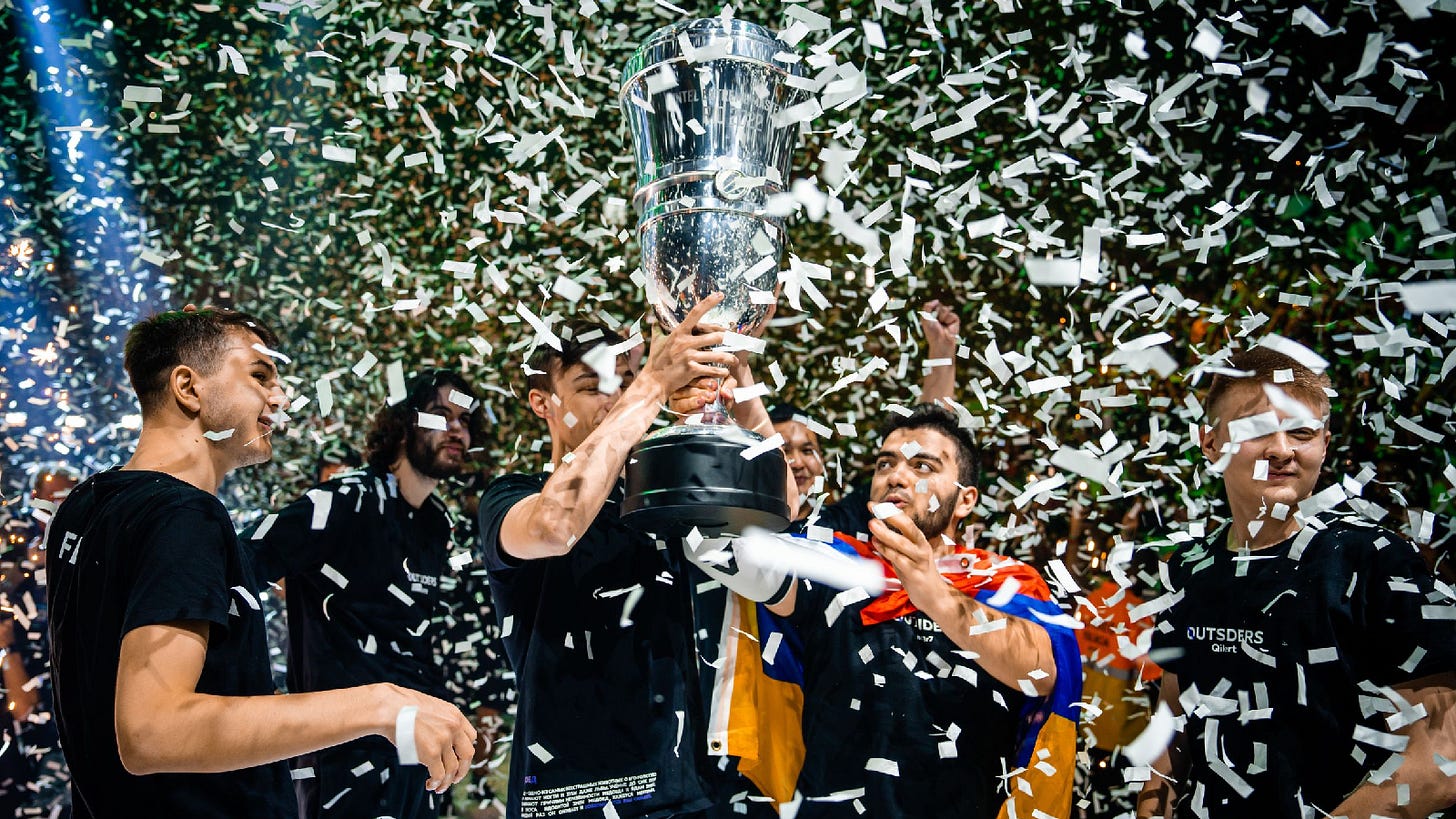
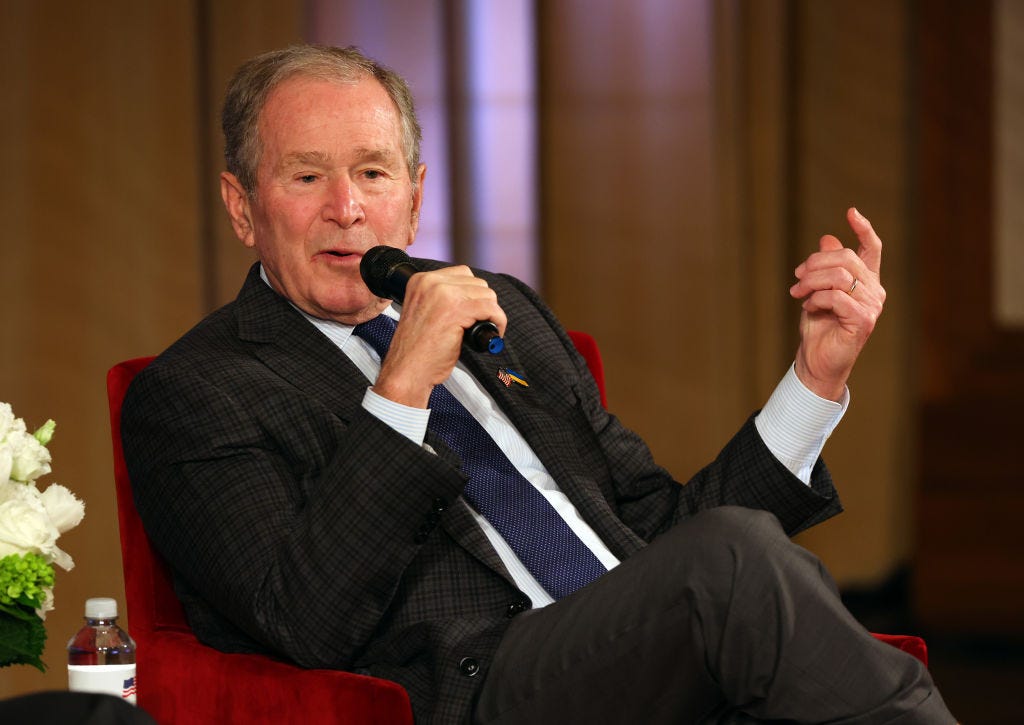
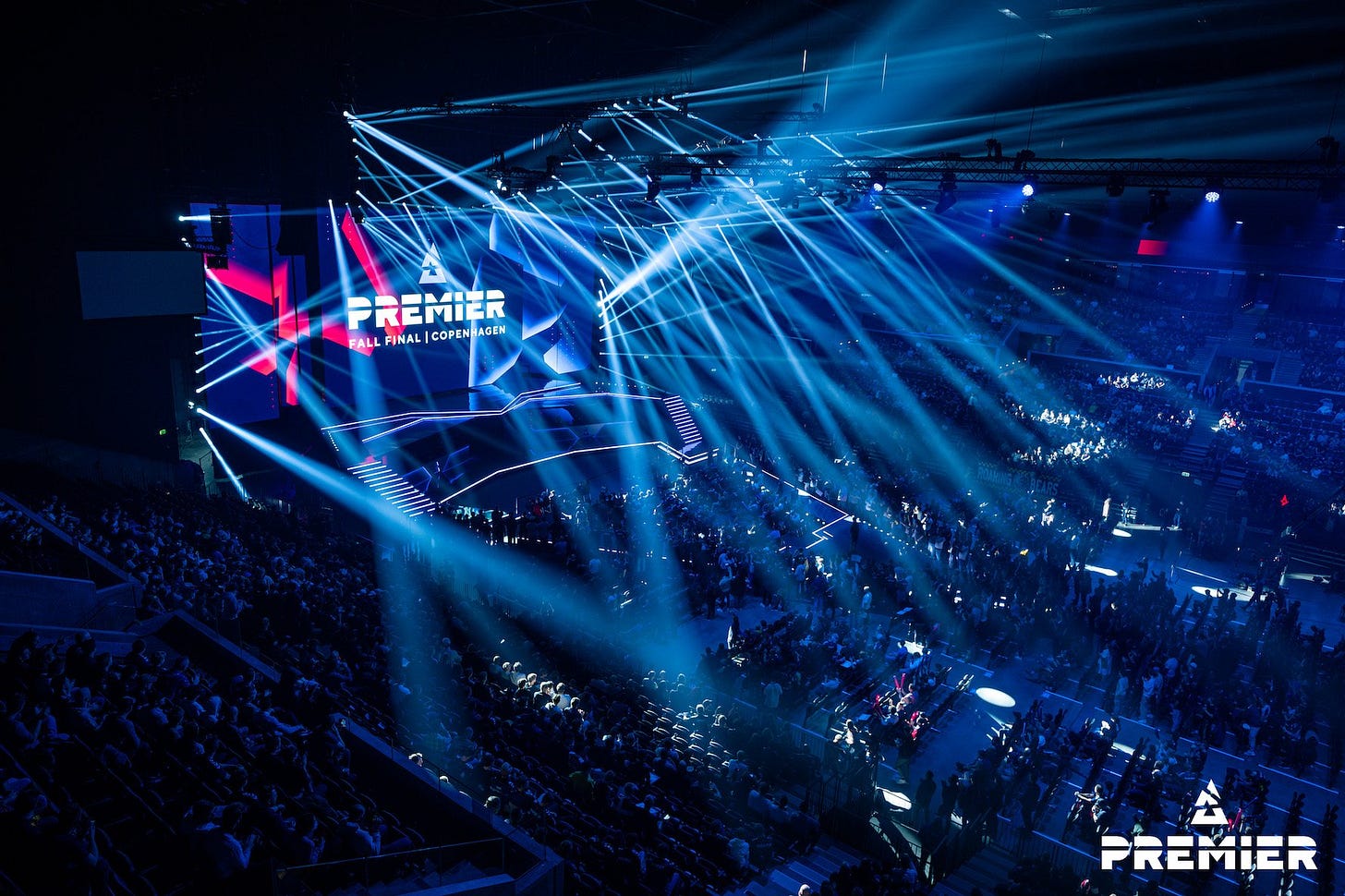
The article is detailed and well-crafted. My observation is, that it highlights that as the issues and pressures within Esports become more visible, it is evolving into something similar to traditional sports—a platform for politicians and other power-seekers to exert influence and their own versions of propaganda.
Honestly what you even talking about? " This becomes especially true when you consider the fact that the young and well-travelled demographic that makes up those who compete in esports are, for the most part, exactly the type of comparative cosmopolitan that do not support the activities of dictators."
I appreciate you shining light on the issue but you seem to disregard all the evidence that speak against your believes.
Did you forget that pure scribbled a "Z" during on of their matches before he joined a EUW team? VP got uninvited from a major because they refused to be shown without the russian flag.
The reality is that a lot of your expatriate "cosmopolitan russians" do not care that there is a war in Ukraine and I would wager there are at least a few of them who are secretly in favour of this war, but they are smart enough to not say anything in the western public. Just because you might know some of them and like them doesn't mean you right in general. I assume in this case your personal attachment is clouding your judgement.
Yes there is a lot of double standard in esports but not addressing them and not allowing things to change makes it even worse. Btw pretty much all major sports (football, tennis, olypmics and so on) have either banned russian orgs or players from competing or at the very least they are not allowed represent their country. And just to clarify only Russians are not allowed to represent their country (removing all flags doesn't mean anything).
I have no clue why Dota as an Esport can not show a baseline level of moral integrity and remove players who are obviously in favour of the war and prevent russians and russian orgs from proudly representing their country.